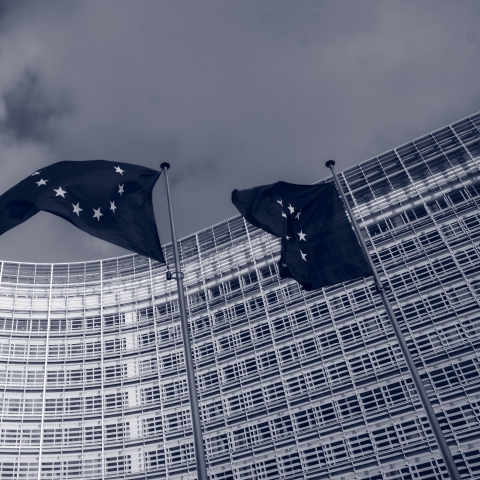

Mark Kaye, PhD Student, explores the Brexit research conducted across the University of Portsmouth
The implications of the UK’s departure from the EU continue to reverberate through UK society; Brexit continues to impact everything from the country’s economy and constitution to its social mores and cultural values
Mark Kaye, PhD Student
January marked five years since the United Kingdom formally withdrew from the European Union. This coming June will mark eight years since the contentious referendum that sealed the decision. This is a long time in politics and even longer in the world of twenty-four-hour news cycles. Yet, even a cursory exploration of contemporary news articles and broadcasts reveals the obstinate nature of Brexit.
The election of a new Labour Government in July brought new possibilities for the future of the UK in Europe, as the Prime Minister promised to ‘reset’ relations with the EU. Meanwhile, the renegotiation of the Trade and Cooperation Agreement sits just beyond the horizon, in 2026. But more than this, in a multiplicity of ways, the implications of the UK’s departure from the EU continue to reverberate through UK society; Brexit continues to impact everything from the country’s economy and constitution to its social mores and cultural values. It therefore remains incumbent on academics across all disciplinary backgrounds to continue their varied and insightful exploration of the Brexit phenomenon, to enhance our collective understanding of its still unravelling consequences.
At University of Portsmouth, we are doing exactly this! Here’s how:
Academic Staff
Our academic staff in the School of Area Studies, Sociology, History, Politics and Literature have been investigating and publishing on Brexit since the referendum in 2016. From various disciplinary and theoretical backgrounds, our staff have published on the implications of Brexit for citizenship and belonging, nationalism, and migration. For instance, Leddy-Owen, Dennis, and Siklodi (2022) investigated how everyday nationhood was expressed on Twitter (now X) during the Brexit negotiations, whilst Sikoldi’s (2023) paper offers an in-depth analysis of perceptions of (Br)exit citizenship. We also have staff who have been investigating what has come to be known as BrexLit. For example, Berberich’s (2022) Brexit and the Migrant Voice: EU Citizens in post-Brexit Literature and Culture, provides a platform for the perspectives of European citizens and migrants living and working in the UK foregrounding their attitudes, their fears, and their concerns about Brexit.
Some examples of this published work are available at the bottom of this article.
Doctoral Research
A number of our doctoral researchers, some of whom are due to finish their PhD’s in the coming year, have been focused on the Brexit phenomenon. Such projects include:
- An exploration of the formative experiences of the English middle-class liberal left and the impact of the affective polarisation revealed by Brexit (Gary Clarke);
- An investigation into the practices of transnational conservation non-governmental organisations operating in the UK, Denmark, Sweden and the extent to which perceived crises, including Brexit, have influenced the day-to-interactions of their transnational cooperation (Dimitra Kiousi);
- An investigation the impact drone technology has on the securitisation of asylum seekers crossing the English Channel by 'small boats', including identifying if Brexit has had any influence on the propagation of the use of the technology and any potential securitisation impacts (Toby Meredith);
- An exploration of how Brexit continues to manifest in the everyday lives of individuals and communities living in the city of Portsmouth (Mark Kaye).
Perspectives on Brexit Research Group
The Perspectives on Brexit (POB) group was founded by PhD students Dimitra Kiousi and Mark Kaye at the University of Portsmouth in 2022. The group provides a transnational, interdisciplinary and theoretically pluralistic space for PhDs and early career researchers (ECRs) engaged in Brexit-related research. They have numerous members across a range of disciplines, institutions and countries. They run a monthly reading group during which we either explore and discuss the latest Brexit-related literature, or to share, scrutinise, and hone their own work. Beyond this, the group held a round-table at the University of Portsmouth in 2023, organised a guest lecture with Prof. Simon Usherwood in the summer of 2024 and held a panel at the 2024 UACES Annual conference. Their work continues with numerous future activities currently in the works.
Brexit Research Publications:
Barios Aquino, M. (2025/Forthcoming) The Coloniality of Civic Integration Requirements in Britain. Learning as a civilising force, Journal of Contemporary European Studies.
Barrios Aquino, M., 2024, ‘I will never be British’: EU citizens and the illusion of belonging in Sredanovic, D. & Byrne, B. (eds.) Brexit and Citizens' Rights: History, Policy and Experience. Manchester: Manchester University Press
Berberich, C. (Ed.). (2022). Brexit and the Migrant Voice: EU Citizens in post-Brexit Literature and Culture (1st ed.). Routledge. https://doi.org/10.4324/9781003148357.
Leddy-Owen, C, Dennis, J. and Siklodi, N (2022) ‘Slaughterhouse cattle are treated better than this’: exploring the salience of everyday nationhood at British airports, Ethnic and Racial Studies, doi.org/10.1080/01419870.2022.2109940
Siklodi, N. (2025/ Forthcoming) European citizenship at the margins: How do CEE migrants respond to threats to their citizenship? In Inclusive Citizenship, Springer, Accessible at: https://link.springer.com/book/9783658457563
Siklodi, N. (2023). (Br)exit citizenship: belonging, rights and participation. Journal of Contemporary European Studies, 1–17. https://doi.org/10.1080/14782804.2023.2298330
The signs that the EU has completely changed its perspective on adding new members since Russia invaded Ukraine
15 September 2023
4 min read

Professor Brad Beaven discusses The Devil's Highway - his new book about London's sailortown
Guy Collender
14 February 2025
11 min listen

